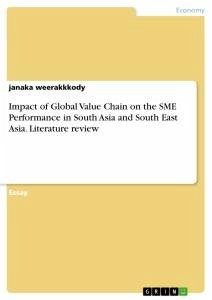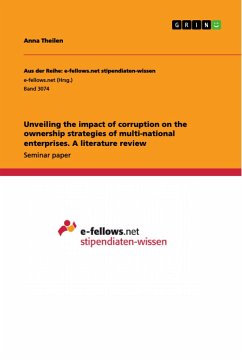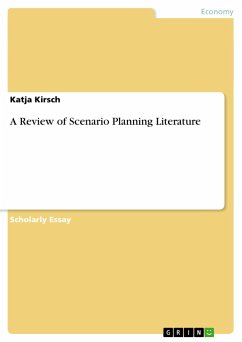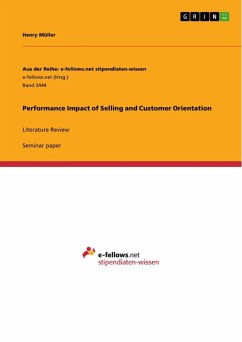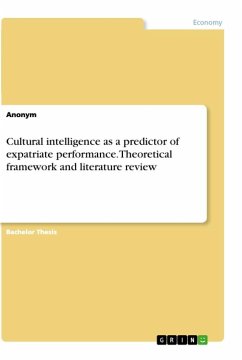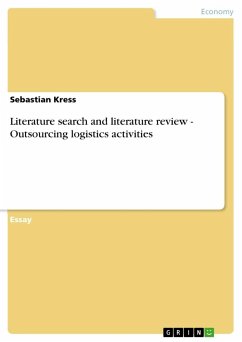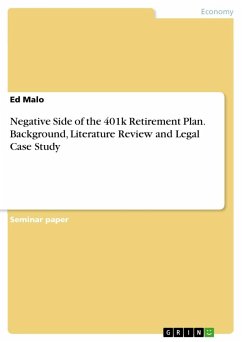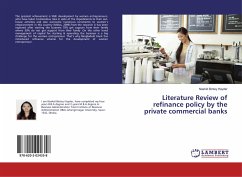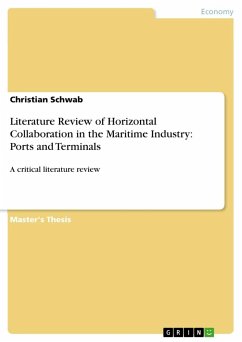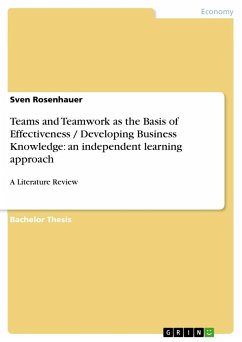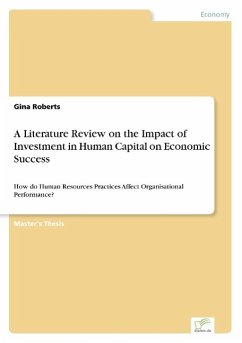
A Literature Review on the Impact of Investment in Human Capital on Economic Success
How do Human Resources Practices Affect Organisational Performance?
Versandkostenfrei!
Versandfertig in 1-2 Wochen
48,00 €
inkl. MwSt.

PAYBACK Punkte
0 °P sammeln!
Master's Thesis from the year 2004 in the subject Business economics - Operations Research, grade: 1,0, LMU Munich (Psychologie und Pädagogik), language: English, abstract: Inhaltsangabe:Abstract:Champions of Human Capital in organisations, such as Human Resources directors, are in need of empirical evidence to justify to board members, CEOs and ultimately shareholders why financial investments into Human Capital should be increased or at least maintained. The research questions posed in this thesis take on the challenge to find empirical evidence that investment in Human Capital, through Hum...
Master's Thesis from the year 2004 in the subject Business economics - Operations Research, grade: 1,0, LMU Munich (Psychologie und Pädagogik), language: English, abstract: Inhaltsangabe:Abstract:
Champions of Human Capital in organisations, such as Human Resources directors, are in need of empirical evidence to justify to board members, CEOs and ultimately shareholders why financial investments into Human Capital should be increased or at least maintained. The research questions posed in this thesis take on the challenge to find empirical evidence that investment in Human Capital, through Human Resources, has a positive impact on intermediate as well as accounting and share-value indicators of organisational performance.
This literature review summarises, integrates and evaluates research published between 1998 and 2003 pertaining to the direct and indirect relationship between Human Resources on different indicators of intermediate and bottom-line performance. The review is comprised of 31 articles clustered into the following topics: strategic HRM, Human Resources Development, technology, diverse workforces and flexible working conditions and methodological issues in HR-organisational performance research.
Evidence for the direct and indirect impact of HR on organisational performance is discussed and the findings are interpreted with reference to Ostroff and Bowen s Multi-Level Model (2000), which explains the individual, organisational and inter-level relationships between Human Resources and organisational performance. Enabling conditions that strengthen the HR-organisational performance relationship are identified. Methodological issues such as levels of analyses, short-term vs. long-term perspectives and generalisability are evaluated in detail.
Employee benefits from enhanced organisational performance and barriers to the diffusion of high-performance work practices are research questions that still remain unanswered (Ichniowski et al., 2000). Future research should focus on building up a portfolio of studies at different levels of analyses and include a broader range of organisational performance variables that are also relevant employees as well as shareholders and top management. The implications of the research findings for HR directors and corporate strategy functions are presented.
Inhaltsverzeichnis:Table of Contents:
1.Introduction4
2.Theoretical Background7
2.1How is Human Capital Conceptualised in the Management Literature?7
2.2The Human Capital Project8
2.3The Story so Far: Theoretical Perspectives on Human Resources Management9
2.3.1Current State of Research on HR Practices and Firm Performance9
2.3.2Four Theoretical Perspectives Explaining why Human Resources Practices matter for Organisational Performance11
2.3.3Multi-Level Model Linking HR Systems to Organisational Performance14
2.4Methodological Issues18
2.5Research Questions21
3.Method22
4.Results26
4.1Strategic HRM27
4.1.1HR Orientation27
4.1.2HRM Effectiveness and Business Strategy29
4.1.3Best Practice and Strategic Fit Models of HRM30
4.1.4High Involvement Work Practices in South Korean Culture33
4.1.5Quality Enhancer Strategy: Total Quality Management37
4.1.6Total Quality Management and Downsizing39
4.1.7Labour Market Flexibility41
4.1.8Role of HRM and Perception of Top Management44
4.1.9Presence of an HR Executive on the Board and Growth rate46
4.1.10HRM Practices and Work Climate47
4.1.11Synthesis of Findings on Strategic HRM and Contingency Variables50
4.2Human Resources Development53
4.2.1Training Effectiveness: Horizontal and Vertical Transfer53
4.2.2Financial Analysis of HRD54
4.2.3Company and Individual Returns to Investment in Education56
4.2.4Alignment of Training with Corporate Strategy57
4.2.5Align...
Champions of Human Capital in organisations, such as Human Resources directors, are in need of empirical evidence to justify to board members, CEOs and ultimately shareholders why financial investments into Human Capital should be increased or at least maintained. The research questions posed in this thesis take on the challenge to find empirical evidence that investment in Human Capital, through Human Resources, has a positive impact on intermediate as well as accounting and share-value indicators of organisational performance.
This literature review summarises, integrates and evaluates research published between 1998 and 2003 pertaining to the direct and indirect relationship between Human Resources on different indicators of intermediate and bottom-line performance. The review is comprised of 31 articles clustered into the following topics: strategic HRM, Human Resources Development, technology, diverse workforces and flexible working conditions and methodological issues in HR-organisational performance research.
Evidence for the direct and indirect impact of HR on organisational performance is discussed and the findings are interpreted with reference to Ostroff and Bowen s Multi-Level Model (2000), which explains the individual, organisational and inter-level relationships between Human Resources and organisational performance. Enabling conditions that strengthen the HR-organisational performance relationship are identified. Methodological issues such as levels of analyses, short-term vs. long-term perspectives and generalisability are evaluated in detail.
Employee benefits from enhanced organisational performance and barriers to the diffusion of high-performance work practices are research questions that still remain unanswered (Ichniowski et al., 2000). Future research should focus on building up a portfolio of studies at different levels of analyses and include a broader range of organisational performance variables that are also relevant employees as well as shareholders and top management. The implications of the research findings for HR directors and corporate strategy functions are presented.
Inhaltsverzeichnis:Table of Contents:
1.Introduction4
2.Theoretical Background7
2.1How is Human Capital Conceptualised in the Management Literature?7
2.2The Human Capital Project8
2.3The Story so Far: Theoretical Perspectives on Human Resources Management9
2.3.1Current State of Research on HR Practices and Firm Performance9
2.3.2Four Theoretical Perspectives Explaining why Human Resources Practices matter for Organisational Performance11
2.3.3Multi-Level Model Linking HR Systems to Organisational Performance14
2.4Methodological Issues18
2.5Research Questions21
3.Method22
4.Results26
4.1Strategic HRM27
4.1.1HR Orientation27
4.1.2HRM Effectiveness and Business Strategy29
4.1.3Best Practice and Strategic Fit Models of HRM30
4.1.4High Involvement Work Practices in South Korean Culture33
4.1.5Quality Enhancer Strategy: Total Quality Management37
4.1.6Total Quality Management and Downsizing39
4.1.7Labour Market Flexibility41
4.1.8Role of HRM and Perception of Top Management44
4.1.9Presence of an HR Executive on the Board and Growth rate46
4.1.10HRM Practices and Work Climate47
4.1.11Synthesis of Findings on Strategic HRM and Contingency Variables50
4.2Human Resources Development53
4.2.1Training Effectiveness: Horizontal and Vertical Transfer53
4.2.2Financial Analysis of HRD54
4.2.3Company and Individual Returns to Investment in Education56
4.2.4Alignment of Training with Corporate Strategy57
4.2.5Align...





